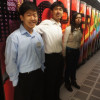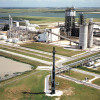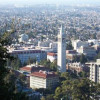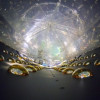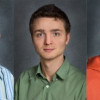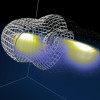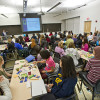News
Berkeley Lab Hosts Albany High Students on Job Shadow Day
For the fourth year in a row, Berkeley Lab staff hosted juniors from Albany High School as part of the school's annual Job Shadow Day. The event matches students with mentors in areas of interest specified by the students. Read More »
New to Computing Sciences - March 2012
Pardeep Pall, Visualization and Analytics Group and James Lee, Computing Sciences IT Infrastructure Team Lead Read More »
Berkeley Lab-led Institute to Help Solve Data-intensive Science Challenges
As scientists around the world address some of society’s biggest challenges, they increasingly rely on tools ranging from powerful supercomputers to one-of-a-kind experimental facilities to dedicated high-bandwidth research networks. But whether they are investigating cleaner sources of energy, studying how to treat diseases, improve energy efficiency, understand climate change or address environmental issues, the scientists all face a common problem: massive amounts of data which must be stored, shared, analyzed and understood. And the amount of data continues to grow – scientists who already are falling behind are in danger of being engulfed by massive datasets. Read More »
New Computer Codes Unlock the Secrets of Cleaner Burning Coal
Approximately half of all electricity used in the United States comes from coal. When burned, this fossil fuel emits pollutants that contribute to smog, acid rain and increased greenhouse gases in the atmosphere. But as the demand for power increases, and affordable renewable energy sources remain years away from offsetting this need, one fact is clear: Coal is here to stay, at least for the foreseeable future. Read More »
Berkeley Lab Staff Offer Career Advice to Kennedy High School Students
Berkeley Lab Computing Sciences Communications staffers Jon Bashor, Margie Wylie and Linda Vu joined Rachel Carl and Jeff Todd of Berkeley Lab Human Resources in a presentation on finding rewarding jobs to juniors and seniors at Kennedy High School in Richmond on Wednesday, March 21.
Read More »
NSF to Help Campuses Embrace 'Science DMZ' Strategy
Scientists across America increasingly rely on remote instruments such as the future Large Synoptic Survey Telescope or the Large Hadron Collider (LHC), and computing facilities such as the National Energy Research Scientific Computing Center (NERSC) to conduct experiments, create simulations, and analyze data. Read More »
Researchers Discover a New Kind of Neutrino Transformation
Neutrinos, the wispy particles that flooded the universe in the earliest moments after the Big Bang, are continually produced in the hearts of stars and other nuclear reactions. Untouched by electromagnetism, they respond only to the weak nuclear force and even weaker gravity, passing mostly unhindered through everything from planets to people. Read More »
Carbon Dioxide Catchers
Approximately 45 percent of electricity used in the United States is produced by coal-burning power plants that spew carbon dioxide (CO2) into the atmosphere and contribute to global warming. To reduce this effect, many researchers are searching for porous materials to filter out the CO2 generated by these plants before it reaches the atmosphere, a process commonly known as carbon capture. But identifying these materials is easier said than done. Read More »
John Shalf's Paper is Among the Best in History of HPDC Conference
“The Cactus Code: A Problem Solving Environment for the Grid,” a paper co-authored by John Shalf of the Computational Research Division, has been selected as one of the top papers in the 20 years of publications from HPDC, the International ACM Symposium on High-Performance Parallel and Distributed Computing. Other authors of the paper, written in 2000, are Gabrielle Allen, Werner Benger, Tom Goodale, Hans-Christian Hege, Gerd Lanfermann, André Merzky, Thomas Radke and Edward Seidel. Read More »
Berkeley Lab Staff Mentor High School Girls in Science Education App Development
Late Tuesday afternoons, as many Lab employees are heading down the Hill after work, a group of more than 60 high school girls from Berkeley and Albany heads up to Berkeley Lab for a series of 10 two-hour workshops to develop science education apps for Android smart phones. Read More »







 Instagram
Instagram YouTube
YouTube